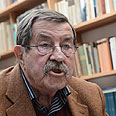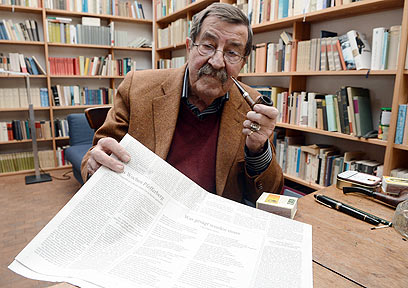
Israel no longer taboo in Germany?
Former Israeli ambassadors to Germany disagree over whether Guenter Grass's controversial poem breaks German taboo in criticizing Israel
From José Saramago to Roger Waters, Israel is no stranger to criticism from artists, writers and philosophers worldwide. But the magnitude of the response to a poem by German author Gunter Grass grew beyond the usual soft condemnation usually practiced in situations like this.
Did 84-year-old Grass break a taboo in the way Germans allow themselves to publicly criticize Israel? Is Germany finally shaking off its sense of commitment toward the Jewish people, 67 years after War World II? Or was this taboo broken many years ago? Two former ambassadors to Germany are in disagreement over this question.
Related Stories:
- Netanyahu: Guenter Grass poem 'shameful' Opinion: Something rotten in Germany
- Germany to honor 3rd Reich soldiers?
"No taboo has been broken," says Shimon Stein, Israeli ambassador to Germany in 2001-2007. Stein claims criticism on Israel has been voiced by many German politicians, including the Chancellor, for several years now. In recent years, Stein adds, many politicians publicly disapproved of Israeli policy regarding the peace process, the settlements and the Israeli response to the Arab spring.
In his poem, published in the daily newspaper Sueddeutsche Zeitung, Grass condemns the plan to deliver a Dolphin submarine to Israel, a vessel with nuclear capabilities, and calls to supervise Israel's nuclear facilities. "I am silent no longer, because I am tired of the West's hypocrisy," writes Grass.
According to Stein, Grass's poem is a typical expression of someone trying to evince courage. Others, Stein argues, have been daring for many years. Only three weeks ago, the German defense minister spoke following the visit of his counterpart, Ehud Barak, saying he is very concerned about a possible Israeli attack on Iran. In fact, Germans oppose any use of force in resolving political problems, an opinion they express time and again with regard to Israel. "

Gunter Grass. Growing criticism on Israel (Photo: MCT)
Stein is convinced that the attention to the poem is a result of the author's history. Grass was a member of Hitler-jugend in his past. "He lost his legitimacy a long time ago," Stein says. According to Stein, the poem is partially anti-Semitic, especially the claim that Israel endangers world peace. According to Stein, had Grass been more specific, without using semi-Nazi expressions, his poem would not have become an issue in Germany.
Primor: Don't link to Nazi pat
Avi Promor, a former ambassador to Germany, thinks differently. He claims that the poem is a serious violation of a taboo in the German public discourse. According to Primor, German public opinion criticizes the poem's massage that Israel threatens world peace, but many still identify with the poem's title: "What Must Be Said."
There is a hidden anger in Germany regarding the fear of criticizing Israel, Primor says, referring to the tendency to dub any attempt of criticism as "anti-Semitism". Grass is not the first to say these things, but his voice is louder, Primor argues adding that the author criticizes this hypocrisy of criticizing Israel behind close doors, but not in public.
Primor wishes to exclude Grass's past in the Waffen SS from the discussion on his poem. "It is a mistake to link this to his Nazi past," he says, arguing that although Grass joined the Nazi youth movement like many at the time, he did not remain loyal to Nazi ideology, and all his books are anti Nazi. Primor insists that there is no anti-Semitism in Grass's speeches and publications, and he doesn't even hate Israel. "It is important to pay attention to the message of the poem," Primor says.
- Receive Ynetnews updates directly to your desktop










